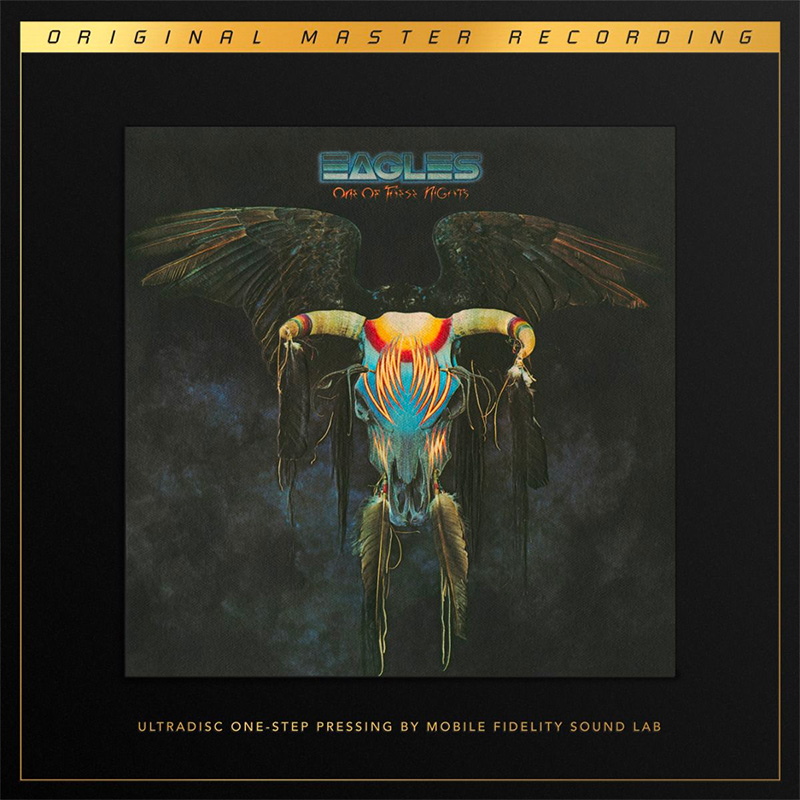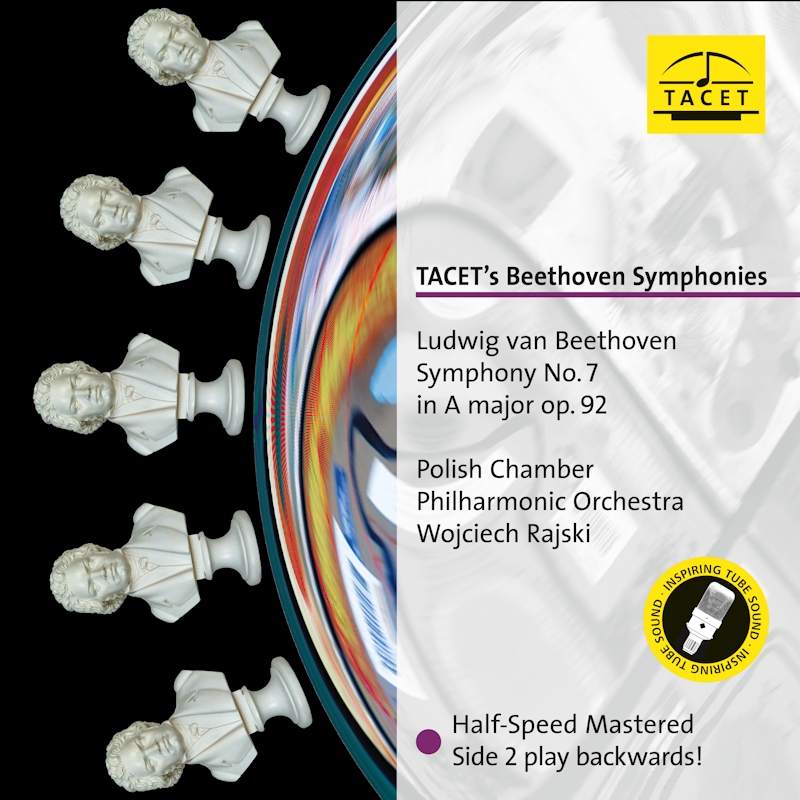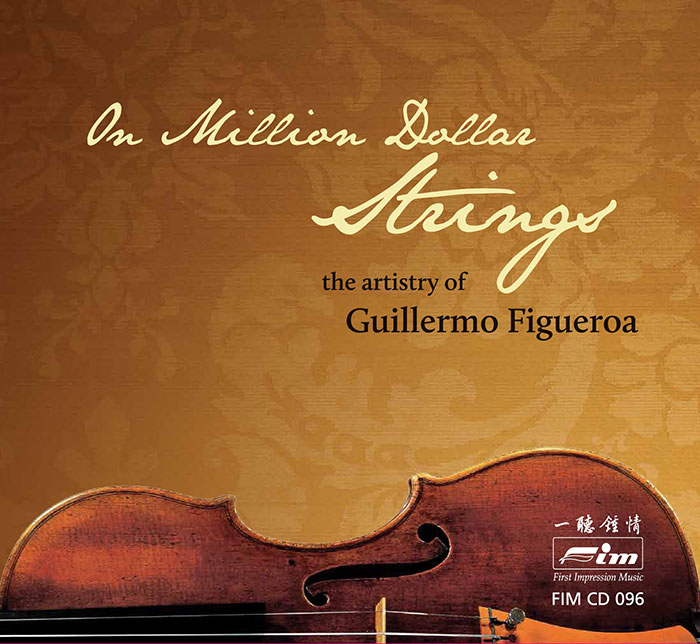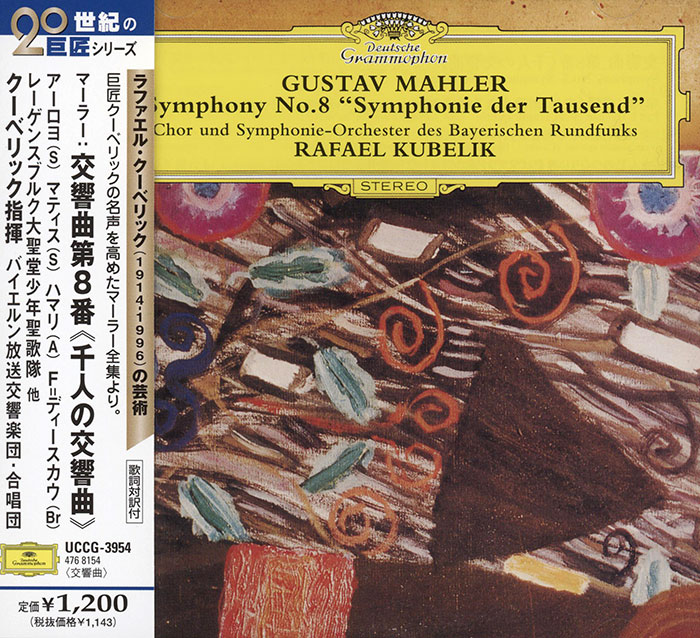Logowanie
OSTATNIE EGZEMPLARZE
Jakość LABORATORYJNA!
ORFF, Gundula Janowitz, Gerhard Stolze, Dietrich-Fischer Dieskau, Deutsche Oper Berlin, Eugen Jochum
Carmina Burana
ESOTERIC - NUMER JEDEN W ŚWIECIE AUDIOFILII I MELOMANÓW - SACD HYBR
Winylowy niezbędnik
ClearAudio
Essence MC
kumulacja zoptymalizowana: najlepsze z najważniejszych i najważniejsze z najlepszych cech przetworników Clearaudio
Direct-To-Disc
PIAZZOLLA, ChamberJam Europe
Tangos del Ángel y del Diablo
Direct-to-Disc ( D2D ) - Numbered Limited Edition
MAHLER, Martina Arroyo, Dietrich-Fischer Dieskau, Rafael Kubelik, Symphonie-Orchester des Bayerischen Rundfunk
Symphony No. 8, 'Symphony of a Thousand'
- Martina Arroyo - soprano
- Dietrich-Fischer Dieskau - baritone
- Rafael Kubelik - conductor
- Symphonie-Orchester des Bayerischen Rundfunk - orchestra
- MAHLER
 Listening to these ten Compact Discs from DG, I have been surprised to find that I have increasingly warmed to Kubelik's view of Mahler, a view that has perhaps been underrated or dismissed as lacking in the intensity and volatility brought to this composer by others. It is true that in the central Nos. 5, 6 and 7, Kubelik does not dig as far below the surface nor soar above the peaks as excitingly as some of his colleagues. But in place of that kind of interpretative insight, he gives us performances that, above all, are profoundly musical, disclosing the beauty and effectiveness of the scoring, the architectural splendour and the genuine symphonic thinking that governs them.
Secondly, these performances, all recorded between 1967 and 1970 with the Bavarian Radio Symphony Orchestra, are notable examples of the understanding that existed between the conductor and the players with whom he had worked since 1961. The playing throughout is of high distinction, with supple strings and a superb woodwind section. Also, all the recordings were made in Munich's Herkulessaal so the sound is always rich and resonant, with DG's engineers at their best in obtaining a natural balance. Only the solo violin in the Scherzo of the Fourth is too closely recorded.
Perhaps because Kubelik is in his element with Mahler's Moravian background, the best performances are those in which the music hymns Nature. That of the First, as it happens, could well be anybody's first choice, a marvellously poetic interpretation with ideal staccato brass in the first movement and crisp, sharply articulated woodwind on their entry in the slow movement. The Fourth is almost as good, the counterpoint clearly delineated in the first movement and, in the Adagio, one experiences the effect of the conductor 'leaning' on the strings to obtain memorably expressive phrasing. Kubelik's wife, the Australian soprano Elsie Morison, is the soloist in the finale—warm lyrical singing without a trace of archness.
The Second is less dramatic than, say, Rattle, less exalted than Klemperer (both EMI), but the fluent tempos in the Scherzo are admirable, the off-stage instruments in the finale ideally placed. Norma Procter is an endearing contralto soloist in ''Urlicht,'' as is Marjorie Thomas in the comparable movement of No. 3, in which I particularly liked Kubelik's tempo for the Adagio, slow enough to be profound but quick enough for the phrasing to hold its long line.
For fine recording and brilliant sound, sample the first movement of No. 5 at about 3'30'' into the disc. Kubelik is at his best here in the Scherzo, full of fantasy and mystery, with the episode for strings pizzicato and woodwind especially magical. In the first two movements, you may find the performance lacking in a sense of pity and terror, as I do those of Nos. 6 and 7. The tempos in the first two movements of No. 6 strike me as too fast, jaunty almost, but Kubelik is consistent in his view of the work as collapsing into tragedy only half-way through the finale.
In No. 7 he is too level-headed, but in the Ninth the subtle shading of the textures in the Adagio, the virtuosity of the playing in the Scherzo and the structural control of the great first movement make this a performance to which one returns with pleasure. Which leaves the Everest of No. 8, in which Kubelik is more persuasive than most in the ''Veni Creator Spiritus''. The Faustian Part 2 has excellent orchestral playing, but the solo singing is often strained and in general the lack of excitement, so essential to success, is a major flaw.
Each of the symphonies is contained on one disc with the exception of No. 3. Its final Adagio shares a disc with the Adagio of No. 10.'
Martina Arroyo (sop)
Erna Spoorenberg (sop)
Edith Mathis (sop)
Júlia Hamari (mez)
Norma Procter (cont)
Donald Grobe (ten)
Dietrich Fischer-Dieskau (bar)
Franz Crass (bass)
Rafael Kubelík Conductor
North German Radio Chorus
West German Radio Chorus
Bavarian Radio Symphony Orchestra
Regensburg Cathedral Choir (Boys' Voices)
Munich Motet Choir
Bavarian Radio Chorus
Listening to these ten Compact Discs from DG, I have been surprised to find that I have increasingly warmed to Kubelik's view of Mahler, a view that has perhaps been underrated or dismissed as lacking in the intensity and volatility brought to this composer by others. It is true that in the central Nos. 5, 6 and 7, Kubelik does not dig as far below the surface nor soar above the peaks as excitingly as some of his colleagues. But in place of that kind of interpretative insight, he gives us performances that, above all, are profoundly musical, disclosing the beauty and effectiveness of the scoring, the architectural splendour and the genuine symphonic thinking that governs them.
Secondly, these performances, all recorded between 1967 and 1970 with the Bavarian Radio Symphony Orchestra, are notable examples of the understanding that existed between the conductor and the players with whom he had worked since 1961. The playing throughout is of high distinction, with supple strings and a superb woodwind section. Also, all the recordings were made in Munich's Herkulessaal so the sound is always rich and resonant, with DG's engineers at their best in obtaining a natural balance. Only the solo violin in the Scherzo of the Fourth is too closely recorded.
Perhaps because Kubelik is in his element with Mahler's Moravian background, the best performances are those in which the music hymns Nature. That of the First, as it happens, could well be anybody's first choice, a marvellously poetic interpretation with ideal staccato brass in the first movement and crisp, sharply articulated woodwind on their entry in the slow movement. The Fourth is almost as good, the counterpoint clearly delineated in the first movement and, in the Adagio, one experiences the effect of the conductor 'leaning' on the strings to obtain memorably expressive phrasing. Kubelik's wife, the Australian soprano Elsie Morison, is the soloist in the finale—warm lyrical singing without a trace of archness.
The Second is less dramatic than, say, Rattle, less exalted than Klemperer (both EMI), but the fluent tempos in the Scherzo are admirable, the off-stage instruments in the finale ideally placed. Norma Procter is an endearing contralto soloist in ''Urlicht,'' as is Marjorie Thomas in the comparable movement of No. 3, in which I particularly liked Kubelik's tempo for the Adagio, slow enough to be profound but quick enough for the phrasing to hold its long line.
For fine recording and brilliant sound, sample the first movement of No. 5 at about 3'30'' into the disc. Kubelik is at his best here in the Scherzo, full of fantasy and mystery, with the episode for strings pizzicato and woodwind especially magical. In the first two movements, you may find the performance lacking in a sense of pity and terror, as I do those of Nos. 6 and 7. The tempos in the first two movements of No. 6 strike me as too fast, jaunty almost, but Kubelik is consistent in his view of the work as collapsing into tragedy only half-way through the finale.
In No. 7 he is too level-headed, but in the Ninth the subtle shading of the textures in the Adagio, the virtuosity of the playing in the Scherzo and the structural control of the great first movement make this a performance to which one returns with pleasure. Which leaves the Everest of No. 8, in which Kubelik is more persuasive than most in the ''Veni Creator Spiritus''. The Faustian Part 2 has excellent orchestral playing, but the solo singing is often strained and in general the lack of excitement, so essential to success, is a major flaw.
Each of the symphonies is contained on one disc with the exception of No. 3. Its final Adagio shares a disc with the Adagio of No. 10.'
Martina Arroyo (sop)
Erna Spoorenberg (sop)
Edith Mathis (sop)
Júlia Hamari (mez)
Norma Procter (cont)
Donald Grobe (ten)
Dietrich Fischer-Dieskau (bar)
Franz Crass (bass)
Rafael Kubelík Conductor
North German Radio Chorus
West German Radio Chorus
Bavarian Radio Symphony Orchestra
Regensburg Cathedral Choir (Boys' Voices)
Munich Motet Choir
Bavarian Radio Chorus

























